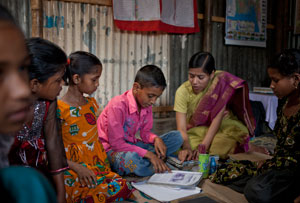AusAID has entered a new five-year partnership with the UK Government's aid agency DFID [external website] and the world's largest NGO BRAC [external website] to transform the lives of millions of Bangladesh's poorest and most vulnerable people.
Foreign Minister Bob Carr, UK Secretary for International Development Andrew Mitchell, and BRAC founder and Chairman Sir Fazle Abed made the announcement in London on 13 June 2012.
"The work of the last 40 years by BRAC–fighting poverty in Bangladesh and beyond–is quite literally changing lives and providing opportunities for an estimated 110 million people," Senator Carr said.
"And Bangladesh is seeing the results. The under-five mortality rate has declined by more than half since 1990, literacy rates have risen steadily in the same period and equal numbers of girls and boys are now enrolled in school.
"This partnership will enable BRAC to help many more of the poorest and most disadvantaged in Bangladesh–including giving more children a primary education and ensuring millions of pregnant mothers give birth with the support of skilled attendants."
Momena, a livestock rearer, credits BRAC's Targeting the Ultra Poor programme in helping her and her family rise out of financial instability. Photo: BRAC
Momena had never been fortunate enough to attend school. As the third child of a labourer, her father's wages were not even enough to provide two meals a day. She, along with her four children, took up domestic work for their survival.
In 2003, Momena was selected as part of a BRAC program to receive training in a chosen business–cattle rearing.
Momena received two cattle to start her business, a weekly allowance as short-term income support, along with vaccines, medicines and vitamins for her cattle. She also received hands-on training, which included learning social issues, writing her name, and the dos and don'ts of cow rearing. When she was ill, she also received medical care and financial support from the programme.
Momena began to make an earning by selling the cows' milk, receiving a daily income of 24–30 taka (29–36 cents) from selling the milk.
Today, Momena owns four cows–which produce four litres of milk every day–as well as three goats, 22 chickens, about 1000 square metres of leased land, 162 square metres of her own land, one rickshaw van, three tin shed rooms, one tube well for safe drinking water and a sanitary latrine. All this was accomplished with the help of BRAC's ultra-poor programme, and later on from access to microfinance, which gave her the confidence to take out loans to buy and lease land to add to her income-generating activities. In the last eight years Momena was able to take out five microfinance loans to strengthen her asset base.
"I had no hope for myself and my family for a better future. When BRAC selected me to be a part of their programme, they gave me the confidence and hope to build a brighter future for my entire family."
About the Partnership
This partnership will help BRAC to continue to provide millions of people with basic health and education services in the poorest and most marginalised communities of Bangladesh, in particular to women and children.
Australia will contribute A$180 million (and the UK A$345 million) over the next five years to:
- support 680,000 children–more than half of them girls–through five years of primary education
- lift 340,000 women and their families out of extreme poverty
- provide contraceptive services to 15 million couples
- ensure that nearly three million women have access to skilled attendants when they deliver their babies.
About BRAC
BRAC is internationally recognised as one of the world's leading development organisations having begun as a grass-roots local initiative in one of the world's poorest countries 40 years ago.
BRAC operates on the philosophy that in order for the poor to come out of poverty, they must have the tools to fight it–such as microfinance, education, healthcare, legal rights training and more.
Why Bangladesh?
Bangladesh, while having made good progress on some Millennium Development Goals–such as reducing income poverty and child mortality, and enrolling nearly all girls and boys into primary school–is still struggling with some key development challenges:
- about 80 per cent of the population live on less that $2 a day
- 47 million are extremely poor, unable to afford enough food
- one woman dies every 45 minutes in childbirth
- around half the country's children are stunted because of malnutrition.
Australian aid to Bangladesh
Australia's aid program to Bangladesh focuses on helping the poorest and most vulnerable. Australia has tripled its aid program to Bangladesh over the past five years and is now one of the country's top five bilateral donors, spending $95 million in 2011-12. The Australian aid program contributes to development progress in Bangladesh by providing assistance in child and maternal health, primary education, poverty reduction and climate change.

